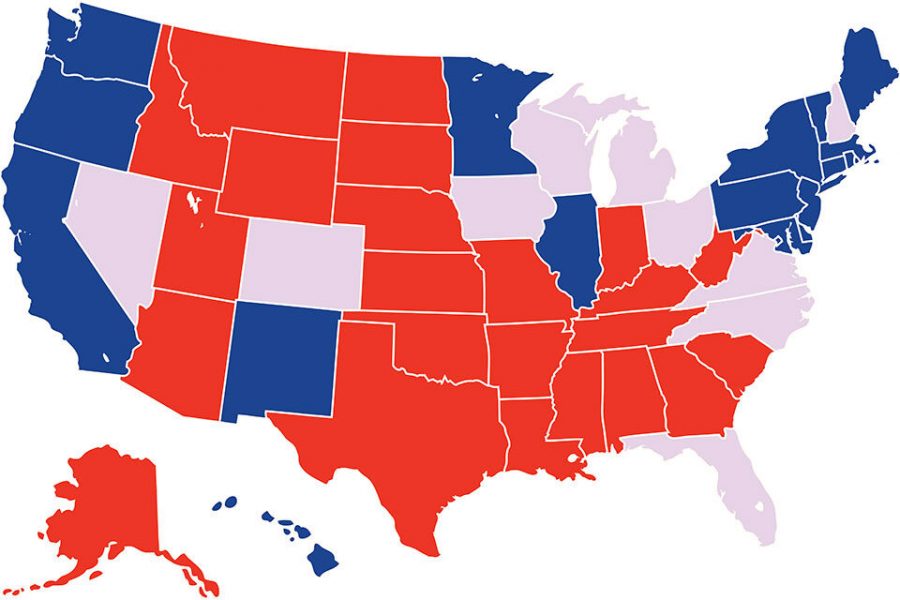Should I stay or should I go? The electoral college dilemma
Courtesy of Salva Regina University
Is the Electoral College a good system? What could replace it?
November 30, 2020
Why the Electoral College should stay:
America is in the midst of a debate concerning how we should elect our executive branch and head of our country. Though there have been multiple attempts to eliminate the electoral college in both the early days of our country and recently, all have fallen short of their goal. Some Americans beg the question Why do we have the electoral college? Why don’t we have a national popular vote determine the winner of the presidency? It’s a long history built on compromises and the idea that all of America’s people were represented.
The founding of our country was a complicated one, to say the least. Born out of the fires of revolution, the young United States worked to develop a way of living that was suitable to stand the tests of time. One of the many challenges the founders ran into was the determination of the President of the United States, where two sides clashed. On one side you had people who believed that a national popular vote should determine the election, while others believed that it should be congress itself that should determine who should be President.
Like many things in American history, it was settled under the compromise. The idea of the electoral college was that the states would vote amongst themselves to determine their choice for president, and then send their electors to meet with other state electors to vote on a president and vice president. That way people had a choice, but it was representatives that ultimately voted on behalf of their state.
This idea keeps less populated states such as Vermont and the Dakotas from being drowned out by the bigger states like California and Texas. Though they have minimal power (all three of the states only have three electoral votes), it keeps their population’s voice heard in the electoral college.
Even if we were to determine an election by a national popular vote, how would we determine who won the election? This may seem like a silly question but it raises a new concern, would it take a plurality or majority in the popular vote to win the presidential election? Under a majority-to-win system, how would the winner of the 2000 and 2016 elections be decided? A whole other run-off? Does Congress decide? Looking into a plurality system, which would probably then do away with the two-party system, what happens when someone wins the election with 20% of the vote?
Even regardless of how we would replace it, under heavily contested and close elections where a few thousand votes can determine the winner, what would a recount situation look like? Looking back at the election of 2000 (where it all came down to Florida), it took a month to find out who won the election due to close results in the state. Imagine this in terms of recounts in various states to certify the popular vote.
The electoral college doesn’t have a favorite party or candidate. Both parties can win it. Though reforms such as mandates eliminating faithless electors can return more power to the people, the electoral college as a whole should be preserved to ensure all voices are heard around the country.
Why We need to get rid of the Electoral College:
When America’s founding fathers were trying to ensure that every person’s vote counted, I don’t think that they anticipated that a single county could harbor a population greater than ten million people. While they certainly did the best with what they knew and understood about the world around them, the change that the world and our country has undergone in the past two centuries is simply unprecedented. Nuclear weaponry, space travel, and the invention of the smartphone all occurred in the last century alone; I don’t think it is fair for a modern society to be restrained by an antiquated system that predates sliced bread. And I certainly don’t think it is fair for some people’s vote to be worth significantly less than others.
Let’s look at Wyoming and California’s electoral votes. Wyoming has 3 votes in the electoral college, whilst California has 55. This sounds pretty fair, right? After all, California does have significantly more people than Wyoming, so of course this would be the case. While on paper it looks like this example would prove that the electoral college is effective, digging a little deeper causes that facade to completely fall away. Wyoming has a population of 532,688 citizens, and California has a population of 39.51 million. Divide both of these numbers by their number of electoral votes, and you’ll see a clear disparity; for every 177,563 people in Wyoming, there is one electoral vote. In California, there is one electoral vote for every 718,182 people. In this scenario each vote in Wyoming is 3.6 times as powerful as every vote in California. If you were to apply the electoral college to a group of people ordering pizza, and three Californians voted for Hawaiian pizza and a person from Wyoming voted for roadkill pizza, guess who would win? The roadkill pizza.
Of course, Wyoming and California aren’t the only states in the union, and there are many other examples of voting disparity that don’t hate on Wyoming locals. But the point is that this system isn’t fair because it gives some people too much power, and some people too little. Any voting system should be able to represent the entire population evenly, no matter if they are located in Nevada or Illinois. While it is important for states to have a voice regardless of size or population, we already have a system in place that addresses that- the Senate. We don’t need to use the Electoral College system, and I honestly doubt that we ever needed it in the first place.




